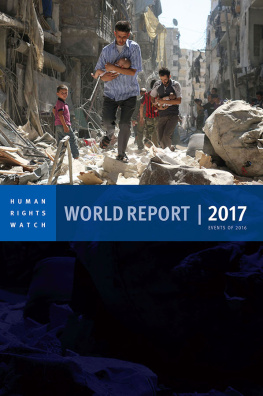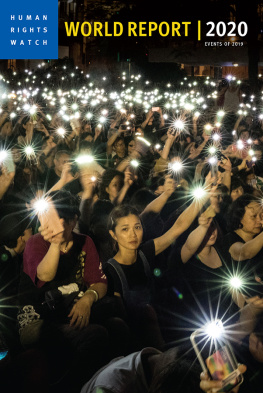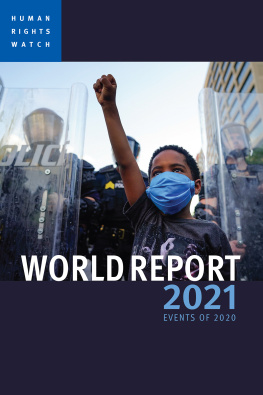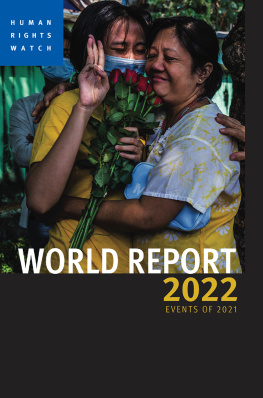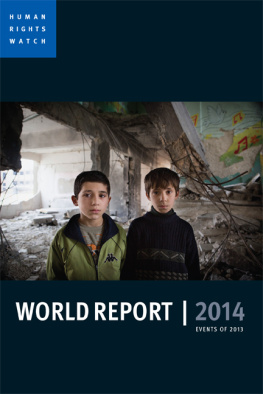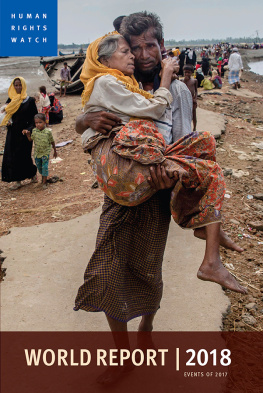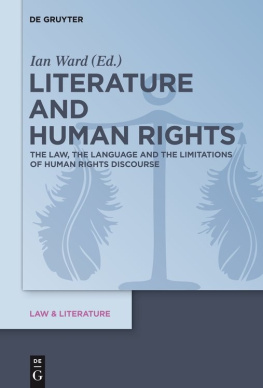We scrupulously investigate abuses, expose the facts widely, and pressure those with power to respect rights and secure justice.
Human Rights Watch is an independent, international organization that works as part of a vibrant movement to uphold human dignity and advance the cause of human rights for all.
Human Rights Watch began in 1978 with the founding of its Europe and Central Asia division (then known as Helsinki Watch). Today, it also includes divisions covering Africa; the Americas; Asia; Europe and Central Asia; and the Middle East and North Africa; a United States program; thematic divisions or programs on arms; business and human rights; childrens rights; disability rights; health and human rights; international justice; lesbian, gay, bisexual, and transgender rights; refugees; womens rights; and emergencies. It maintains offices in Amsterdam, Beirut, Berlin, Brussels, Chicago, Geneva, Johannesburg, Kiev, London, Los Angeles, Moscow, Nairobi, New York, Paris, San Francisco, Sao Paulo, Silicon Valley, Stockholm, Sydney, Tokyo, Toronto, Washington DC, and Zurich, and field presences in over 46 other locations globally. Human Rights Watch is an independent, nongovernmental organization, supported by contributions from private individuals and foundations worldwide. It accepts no government funds, directly or indirectly.
HUMAN RIGHTS WATCH
The staff includes Kenneth Roth, Executive Director; Michele Alexander, Deputy Executive Director, Development and Global Initiatives; Nic Dawes, Deputy Executive Director, Media; Iain Levine, Deputy Executive Director, Program; Chuck Lustig, Deputy Executive Director, Operations; Bruno Stagno Ugarte, Deputy Executive Director, Advocacy; Chris Albin-Lackey, Senior Legal Advisor; Walid Ayoub, Information Technology Director; Pierre Bairin, Media Director; Clive Baldwin, Senior Legal Advisor; Liba Beyer, Senior Director, Public Advocacy and Outreach; Laura Boardman, Managing Director, Development and Global Initiatives; Philippe Bolopion, Deputy Director for Global Advocacy; Grace Choi, Director, Publications and Information Design; Matthew Collins-Gibson, Managing Director, Leadership Gifts; Emma Daly, Communications Director; Alan Feldstein, Associate General Counsel; Barbara Guglielmo, Director of Finance; Jasmine Herlt, Managing Director, Development and Global Initiatives; Miriam Mahlow, Managing Director, Development and Global Initiatives; Veronica Matushaj, Director, Documentary Video and Photography; Stephen Northfield, Digital Director; Babatunde Olugboji, Deputy Program Director; Dinah PoKempner, General Counsel; Tom Porteous, Deputy Program Director; Aisling Reidy, Senior Legal Advisor; James Ross, Legal and Policy Director; Joseph Saunders, Deputy Program Director; Elizabeth Seuling, Managing Director, Development and Outreach; Frances Sinha, Global Human Resources Director; and Minky Worden, Director of Global Initiatives.
The division directors of Human Rights Watch are Brad Adams, Asia; John Biaggi, International Film Festival; Peter Bouckaert, Emergencies; Zama Coursen-Neff, Childrens Rights; Richard Dicker, International Justice; Bill Frelick, Refugees Rights; Arvind Ganesan, Business and Human Rights; Liesl Gerntholtz, Womens Rights and (acting) Africa; Steve Goose, Arms; Nadim Houry, Terrorism/Counterterrorism; Diederik Lohman (acting), Health and Human Rights; Maria McFarland Snchez-Moreno, United States; Alison Parker, United States; Shantha Rau Barriga, Disability Rights; Graeme Reid, Lesbian, Gay, Bisexual, and Transgender Rights; Jos Miguel Vivanco, Americas; Sarah Leah Whitson, Middle East and North Africa; Janet Walsh (acting), Womens Rights; and Hugh Williamson, Europe and Central Asia.
The advocacy directors of Human Rights Watch are Daniel Bekele, Africa; Maria Laura Canineu, Brazil; Louis Charbonneau, United NationsNew York; Farida Deif, Canada; Kanae Doi, Japan; John Fisher, United NationsGeneva; Meenakshi Ganguly, South Asia; Bndicte Jeannerod, Paris; Lotte Leicht, European Union; Sarah Margon, Washington DC; David Mepham, UK; Wenzel Michalski, Berlin; Mns Molander, Stockholm; Elaine Pearson, Australia; and Anna Timmerman, the Netherlands.
The members of the board of directors are Hassan Elmasry, Co-Chair; Robert Kissane, Co-Chair; Michael Fisch, Vice-Chair & Treasurer; Oki Matsumoto, Vice-Chair; Amy Rao, Vice-Chair; Amy Towers, Vice-Chair; Catherine Zennstrm, Vice-Chair; Bruce Rabb, Secretary; Karen Herskovitz Ackman; Akwasi Aidoo; Jorge Castaeda; Michael E. Gellert; Leslie Gilbert-Lurie; Paul Gray; Betsy Karel; David Lakhdhir; Kimberly Marteau Emerson; Joan R. Platt; Neil Rimer; Shelley Rubin; Ambassador Robin Sanders; Jean-Louis Servan-Schreiber; Sidney Sheinberg; Bruce Simpson; Donna Slaight; Siri Stolt-Nielsen; Darian W. Swig; Makoto Takano; Peter Visser; and Marie Warburg.
Emeritus board members are Joel Motley, Chair, 2013-2016; James F. Hoge, Jr., Chair, 2010-2013; Jane Olson, Chair 2004-2010; Jonathan F. Fanton, Chair, 1998-2003; Robert L. Bernstein, Founding Chair, 1979-1997; Lisa Anderson; David M. Brown; William D. Carmichael; Vartan Gregorian; Alice H. Henkin; Stephen L. Kass; Wendy Keys; Bruce Klatsky; Joanne Leedom-Ackerman; Josh Mailman; Susan Manilow; Samuel K. Murumba; Peter Osnos; Kathleen Peratis; Marina Pinto Kaufman; Sigrid Rausing; Victoria Riskin; Orville Schell; Gary Sick; Malcolm B. Smith; and John Studzinski.
Table of Contents
Foreword
World Report 2017 is Human Rights Watchs 27th annual review of human rights practices around the globe. It summarizes key human rights issues in more than 90 countries and territories worldwide, drawing on events from late 2015 through November 2016.
The book is divided into two main parts: an essay section, and country-specific chapters.
In his keynote essay, The Dangerous Rise of Populism: Global Attacks on Human Rights Values, Human Rights Watch Executive Director Kenneth Roth examines the rise of leaders who, claiming to speak for the people amid rising public discontent over the status quo, reject rights as an impediment to their perception of the majority will. Roth sees such unrestrained majoritarianism and assaults on government checks and balances as perhaps the greatest danger today to the future of democracy in the West. The past should serve as our guide he warns: leaders who have claimed insight into the will of the majority have gone on to crush the individual who stands in their way. We should never underestimate the tendency of demagogues who sacrifice the rights of others in our name today to jettison our rights tomorrow when their real priorityretaining poweris in jeopardy, he writes. Rather than taking on this surge of populist attacks on human rights, he says, too many Western leaders are lying low, hoping the winds of populism will blow over. Some seem to think that echoing populists positions will mitigate their rise rather than reinforcing their message. Others, such as Russias Vladimir Putin, Turkeys Recep Tayyip Erdoan, Abdel Fattah al-Sisi of Egypt, and Syrias Bashar al-Assad, appear emboldened in their repressive path by the rise of Western populism, and by the Wests muted response.

